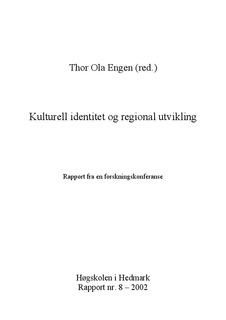Kulturell identitet og regional utvikling
Abstract
I samarbeid med Hedmark fylkeskommune og Norges forskningsråd, arrangerte
Flerfaglig gruppe for minoritetsstudier ved Høgskolen i Hedmark den 10. - 12. januar
2002 en forskningskonferanse på Victoria hotell, Hamar, med tittelen Kulturell
identitet og regional utvikling.
Konferansen hadde sin bakgrunn i et initiativ fra Fylkeskommunen om å skape større
forskningsmessig interesse for Finnskogen og den skogsfinske kulturen blant forskere
som har arbeidet med etniske minoriteter og / eller regioner i et kulturelt og / eller
næringspolitisk perspektiv, og forskere som har arbeidet med regional utvikling eller
lokal næringsutvikling.
Konferansen var bygd opp rundt et antall plenumsforedrag fra inviterte bidragsytere på
en rekke forskjellige fagområder fra Finland, Sverige og Norge. Disse er samlet i
denne rapporten. I tillegg er de fleste av konferanseinnleggene også samlet. English: In cooperation with the regional authorities of the County of Hedmark and the
Norwegian Research Council, the Multidiciplinary group for minority studies at
Hedmark University College set up a research conference at Victoria hotel, Hamar.
The conference took place on 10. - 12. January 2002 under the title Cultural Identity
and Regional Development.
The main objective of the conference was to awaken a new interest among researchers
from various research fields, in order to initiate projects concerning the Finn forest
area situated on the Norwegian -Swedish border and the culture of the inhabitants of
this area, descending from Finish immigrants.
In this report the plenary speeches of a number of invited key note speakers from
Finland, Sweden and Norway, representing different research fields, are published. In
addition some of the papers are presented included. The report contains a few
comprehensive research overviews concerning immigrants of Finish ascendancy in
central and Northern Scandinavia. In addition the main topics covered are Norwegian
immigrant history, regional identities and regional development, the socio-political
dynamics of languages, the interrelationship between central and peripheral regions
and the relationship between the cultural context of the researcher and the
understanding of cultural practices of indigenous people.
